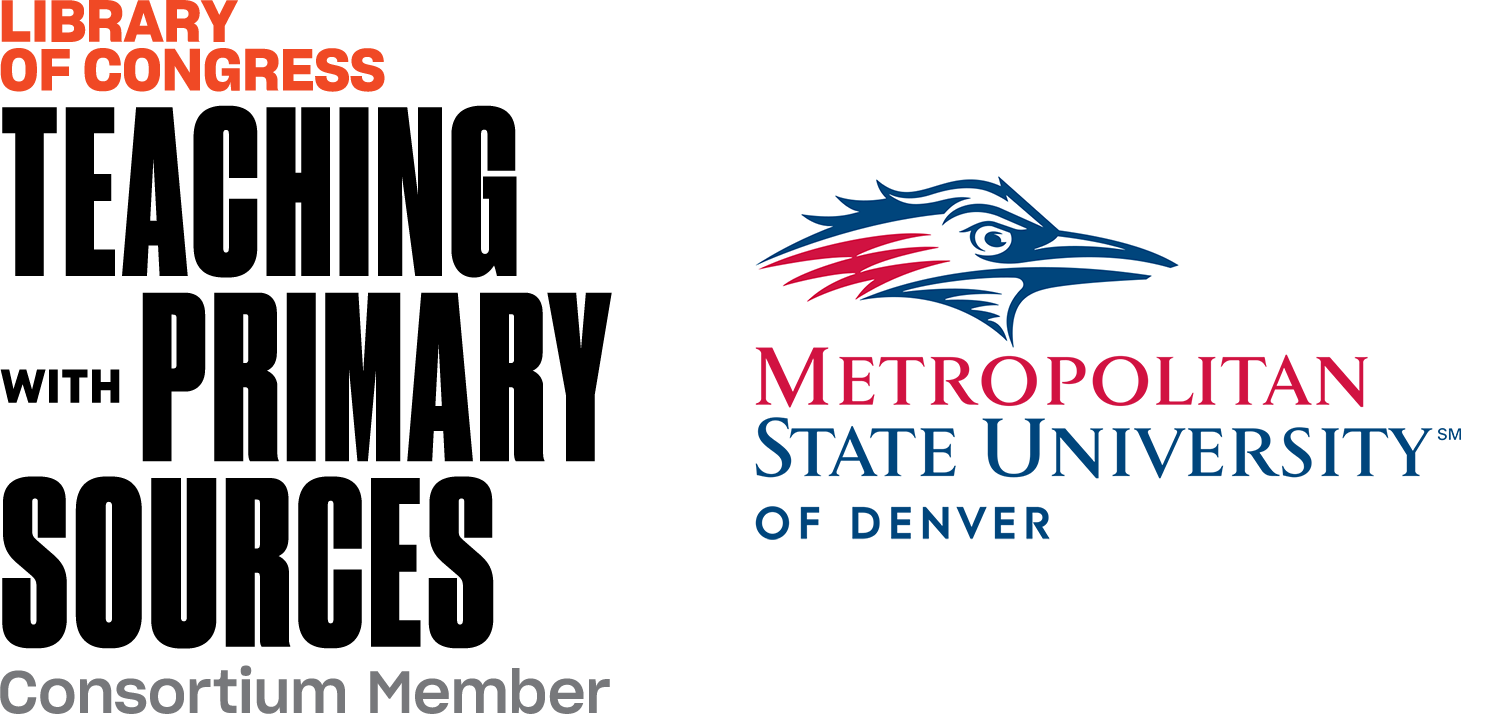After a small scare at the beginning of the week with the weather forecasting snow on February 24th, 2017, Teacher Librarian Day was a huge success once again. Over 150 teachers, librarians, and education specialists from all across Colorado showed up excited to listen to our 10 speakers and get resources from 18 different educational resource tables.
After a welcoming breakfast (and of course coffee), educators participated in a quick questioning activity using primary sources called Question Writer. It is a short adaptation of the Question Formulation Technique (QFT) from the Right Question Institute (RQI), that is meant to spur purposeful questions about a particular primary source.
Students will write down as many questions as they can in a certain time frame (1-10 minutes), label their questions with a ‘C’ for a closed-ended questions, and an ‘O’ for an open-ended question. Then, they choose the open ended question that they are most interested in to discuss in small groups. Download the activity sheets here:
[foogallery id=”3881″]Photos used for morning activity:
- Cats – Question Settled
- Basketball Players doing Charleston
- Civil War Balloon
- Colorado Bean Threshers
- Portland Oregon 60 planes
- Dive bomber almost crashing into ship
- Municipal Bat Roost
- Women with Fish Fashion
- Dazzle Camo Ships
Our speakers at TLD this year were once again phenomenal. Each speaker brought their own unique approach to teaching with primary sources, and offered participants a slew of ideas for project-based learning (PBL), cross-curriculum strategies, and the importance of agile teachers in all K-12 grades and beyond.
Kristen Lewis, current Dean of Students at Boulder High School, National History Day (NHD) High School Educators of the Year in 2015, and World History teacher, spoke about how a project-based learning classroom that incorporates NHD inspires and prepares students for college and beyond.
ForBlog_Inspiring-Critical-Thinking-NHD-1
Kent Willmann, long time high school social studies teacher and current curriculum writer for Lessons on Local Government and School of Education instructor at CU Boulder, spoke about the importance of civics and educating students about the elements of citizenship most important to our democracy, from the local to the federal government.
tld-2017-Plato-Citizen-The-Title-of-Citizen
Renee Ruderman, Associate Professor of English at MSU Denver, reminded teachers about the power of poetry for all grade levels by inviting teachers to participate in writing a Shakespearean Sonnet in 10 minutes.
PROJECTION_Renee-Ruderman_Better-than-Video-Games-the-sonnet-17
Thomas G. Andrews, Professor of History at CU Boulder and author of “Killing for Coal: America’s Deadliest Labor War”, spoke about animal history asking, what might we discover about the human past by paying closer attention to other-than-human animals?
Shaun T. Schafer, Associate Chair of the Department of Journalism and Technical Communication at MSU Denver, discussed the timely topic of fake news, helping educators incorporate instruction in their classrooms to help spot fake news and the importance of considering sources.
Marc Pomeroy, chemist and laboratory supervisor, and Susan Allspaw-Pomeroy, poet and IT professional, spoke about the US Antarctic Program and how cross-curricular efforts combining STEM and the Arts can create language-bending, history-hat-tipping, and scientific method critical thinking.
Taylor Kendal, previous Project Coordinator for Teaching with Primary Sources and current Instructional Designer at MSU Denver, spoke about how the practice of A/B Testing can create an adaptable and comfortable classroom and prepare the technium of tomorrow.
Ashby Butnor, philosophy professor at CSU specializing in Asian philosophy, ethics, feminist theory, and high-impact teaching and learning practices, spoke about how philosophy can be incorporated in the K-12 classroom to help explore critical inquiry.
Peggy O’Neill-Jones, Director of the Teaching with Primary Sources Western Region, and Kelly Jones-Wagy, social studies teacher at Overland High School, spoke about Twitter as yesterday’s telegram, and how social media is a primary source meant to be analyzed using historical thinking skills for author intent, audience, evidence, and accuracy.
Rolly Schendel, prior elementary teacher and current Assistant Professor of Literacy at MSU Denver, spoke about his experiences teaching using project-based learning particularly with class pets, and how educators truly do make an impact on their student’s lives, which is one important thing that teachers often forget in their overworked and busy careers.
The Learning Fair this year included 18 Colorado educators and educational organizations, including:
- Kelly Jones-Wagy
- Rocky Mountain PBS
- Colorado Department of Education
- Denver Public Library
- Stephen Hart Library and Research Center
- April Pishna
- Maggie’s Suitcase
- NHD in Colorado
- Denver Post’s Newspapers in Education
- Lessons on Local Government
- Colorado State Library
- TPS Teachers Network
- Facing History and Ourselves
- History Colorado
- Michelle Pearson and Cindy Stout
- Colorado Geographic Alliance
- Inspire Colorado
TLD would not have been such a huge success if not for all of our presenters, Colorado’s educational resources in the Learning Fair, and of course our amazing sponsors, History Colorado, National History Day in Colorado, Lessons on Local Government through the Colorado Municipal League, and most importantly, the Library of Congress Teaching with Primary Sources program.
Want to schedule a TPS training at your school or district? We can customize the content and strategies to meet your curriculum needs. Contact us!




